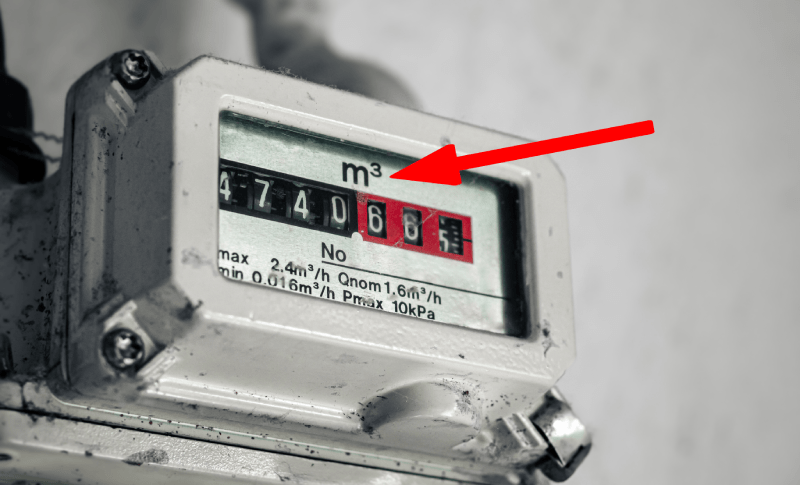The quantity of natural gas is usually expressed in cubic meters (m3). If you want to know much electricity will burning gas generate, you have to convert gas m3 into kWh (kilowatt-hours). You will usually find the m3 on gas meters that look like this:

To help you out, we have created an m3 to kWh calculator. You simply input cubic meters (m3) and the calculator will dynamically convert m3 into kWh. Basically, we have to convert gas units to kWh.
Here’s an example of what the m3 to kilowatt-hour conversion calculator looks like:

Below the calculator, you will also find the m3 to kWh conversion chart with calculated values of kWh for the corresponding m3 of natural gas.
Let’s first look at the equation that converts m3 of natural gas to kWh. The key thing to remember is that 1 m3 of natural gas doesn’t always generate the same amount of electricity (kWh).
That’s because the energy density of natural gas varies a bit depending on the quality of natural gas (some produce more kWh, others less kWh):
Table of Contents
m3 To kWh Conversion Formula
Different qualities of natural gas have different energy densities. That’s why we use a bit more complex equation to convert m3 to kWh precisely:
m3 × Calorific Value × 1.02264 ÷ 3.6 = kWh
The caloric value of natural gas is the parameter that changes. It’s usually around 40.0; depending on the quality of natural gas it can deviate +/-5%. 1.02264 is a correction factor, and 3.6 is the conversion factor for kWh.
For extremely precise calculations, we would you the upper equation. However, without more than a 5% loss in accuracy, we can simplify it quite a bit.
If you want to convert m3 to kWh, you just need to use this simple formula:
1 m3 = 10.55 kWh
Before we use the calculator that converts m3 gas into kWh, let’s look at both quantities:
Cubic Meter or m3 (Volumetric Quantity Of Natural Gas)
Gasoline, diesel, and liquid propane are measured in liters (or gallons) because they are liquids. Natural gas, on the other hand, is a gas; in a gaseous state.
That’s why we use m3 of natural gas to tell how much natural gas we have. Cubic meters are a unit of volume.
1 m3 of natural gas is equal to:
- 35.315 cubic feet of natural gas.
- 35,300 BTU.
- 31,736 kJ.
- 7,580 kcal.
- 10.55 kWh.
Kilowatt-Hour Or kWh (Unit Of Electric Energy Per Hour)
Electric energy is measured in watts. 1000 watts is equal to 1 kW; kilowatt. If we run a 1,000W electric appliance for 1 hour, we spend 1 kWh of electricity. 1 kWh of electricity costs anywhere from 0.10€ (Bulgaria) to 0.30€ (Germany).
To generate 1 kWh of electricity, we have to combust 0.0947 m3 or 94.7 liters of natural gas (100% efficient combustion).
We can use this data to calculate how many kWh will burning any amount of natural gas (expressed in m3) generate:
Gas m3 To kWh Calculator
You just insert m3 and the converter will dynamically calculate kWh. You can play around with the numbers a bit if you wish:
Note: It needs to be pointed out that natural gas does not have 100% efficiency. Power plants using natural gas can have more than 80% efficiency, according to the American Council for an Energy-Efficient Economy. Natural gas generators, however, can have anywhere from 20% to 70% efficiency, thereby reducing the actual kWh we can get from natural gas.
Residential gas furnaces can have over 95% efficiency when burning natural gas as you can see here. This efficiency in furnaces is denoted by the AFUE rating.
m3 Natural Gas To kWh Calculated Table
To help you out, we have used the calculator above to make some of the most common m3 to kWh conversions, and summarized them in the table here:
| m3 Of Natural Gas: | Kilowatt-Hours (kWh): |
| 1 m3 gas | 10.55 kWh |
| 5 m3 gas | 52.75 kWh |
| 10 m3 gas | 105.50 kWh |
| 20 m3 gas | 211.00 kWh |
| 30 m3 gas | 316.50 kWh |
| 40 m3 gas | 422.00kWh |
| 50 m3 gas | 527.50kWh |
| 75 m3 gas | 791.25kWh |
| 100 m3 gas | 1,055 kWh |
| 200 m3 gas | 2,110 kWh |
| 300 m3 gas | 3,165 kWh |
| 400 m3 gas | 4,220 kWh |
| 500 m3 gas | 5,275 kWh |
| 750 m3 gas | 7,912.50 kWh |
| 1,000 m3 gas | 10,550 kWh |
Hopefully, this will help you adequately determine the kWh value of natural gas. If you have any questions regarding the calculations, you can pose them in the comments below and we’ll try our best to help you out.
Related posts:
- Understanding COP: Coefficient Of Performance Of Heat Pumps
- Convert BTU To Tons: How Many BTU In A Ton?
- How To Calculate SEER Rating? Here’s How SEER Is Calculated
- Convert PSIG To PSIA: Calculator + Conversion Chart (Dead Simple)
- Therms To MCF Conversion: Calculator + Chart For Natural Gas